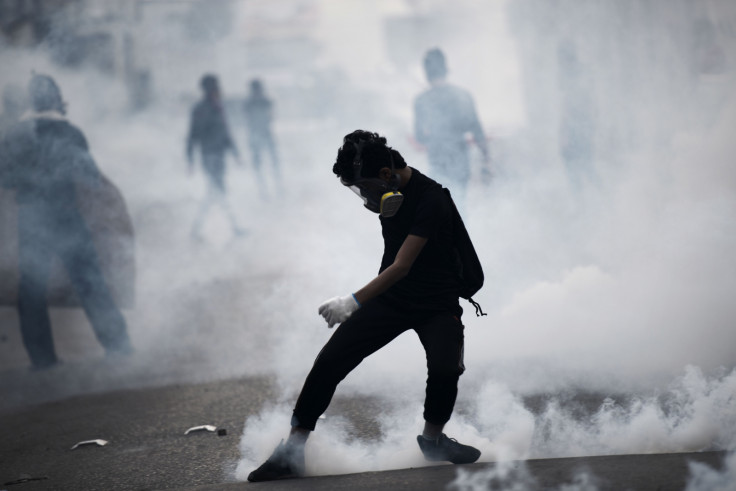Bahrain: Economy in tatters as rulers spend island nation's coffers crushing dissent

The year got off to a bad start, but few could have predicted how bad it would become for Bahrain: 2015 has seen not just a deterioration of political and civil rights, but the impact of authoritarian policies on the economy and on the lives of everyone in the country.
It began with the arrest on 27 December 2014 of Shaikh Ali Salman, leader of al-Wefaq, Bahrain's largest political party. He was charged for inciting hatred against the regime – a charge Human Rights Watch disputes – and in June was sentenced to four years imprisonment. Around the same time, the leader of another political party, Fadhel Abbas of Al Wahdawi, was sentenced to five years for criticising Saudi Arabia's war in Yemen, which Bahrain is a part of.
Bahrain's economic woes are closely tied to its human rights record. Allow political reform, empower parliament, stop torturing prisoners – the demands of 2011 are more relevant than ever.
Bahrain offset these violations by releasing Ebrahim Sharif, former leader of the secular Wa'ad society. The US praised Sharif's release in early July, when they lifted the four-year arms sales ban to Bahrain, first implemented at the height of civil unrest and political violence during 2011's Arab Spring uprising.
But, just three weeks after Sharif's release, police rearrested the politician and charged him with inciting hatred against the regime after he gave a speech calling for sustained, peaceful opposition to government policies.
The silencing of the political opposition and local human rights groups is nearly complete. It has been conducted entirely through the law courts – a trick which has allowed less rights-attentive allies like the United Kingdom to ignore because 'due process' was followed, without regard to the fact that the laws and courts are shamelessly rigged to favour the government at every stage of the legal process.
Regionally, Bahrain has embroiled itself in two wars without foreseeable ends: the US coalition against Islamic State (Isis) and Saudi Arabia's unnecessary war against Yemen. Bahrain's commitment to the former is not insubstantial, and little has been done to curb extremism at home, while the latter campaign, backed by the US and UK, has created a humanitarian crisis of heart-wrenching proportions – with an estimated 21 million Yemenis requiring aid. The aggressive war in Yemen has only served to spread instability in the Gulf and drain Bahrain's resources.
Yet this year has been grimmer still than Shaikh Salman's arrest initially suggested. This summer, amid anxiety over a delayed government budget, and five years after it was first introduced to Britain under the guise of fiscal responsibility, austerity finally arrived at the shores of Bahrain.
Bahrain has a BHD 1.5 billion (GBP £2.5 billion) deficit to wrangle with – if that doesn't sound much in comparison to the other countries' deficits, bear in mind that its market, GDP and total population are also relatively small. The government doesn't seem know what to do.
On 17 September, the country's king decreed into existence a 'miniature government' headed by his son the Crown Prince to deal with the issue – apparently working around Prime Minister Khalifa bin Salman Al Khalifa (the latter is the longest-serving prime minister in the world and the King's uncle, whose resignation was one of the first calls in 2011's uprising).
First on the agenda is the cutting of meat, electricity and fuel subsidies, among others. The price of meat is expected to double when the subsidy ends in October, a price rise that will hurt those in poverty in the most.
While Bahrainis prepare to endure falling living standards as cuts hit welfare spending, there is as yet no talk of slashing the police and defence spending. These have grown substantially since 2011 and today account for nearly a third of all government expenditure.
This huge spending can be partially explained by an enlarged security force bolstered by foreign national recruits – many of them Pakistanis and Sunni Arabs, naturalised (there are some 30,000 naturalised Pakistanis in Bahrain, a large proportion of whom are believed to work in the military and police). These naturalised officers are given a free home and a guaranteed job. They are part of a self-perpetuating, government-made cycle of extravagant welfare, excessive security spending and political violence.
Bahrain's economic woes are closely tied to its human rights record. Allow political reform, empower parliament, stop torturing prisoners – the demands of 2011 are more relevant than ever. If implemented, Bahrain would immediately free itself (and its money) from an extravagant police apparatus and finally bring about local stability – that elusive condition for new investment, both local and international.
© Copyright IBTimes 2025. All rights reserved.






















